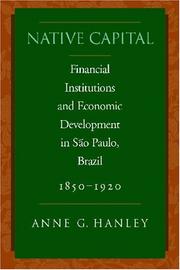| Listing 1 - 3 of 3 |
Sort by
|

ISBN: 0804788197 9780804788199 0804750726 9780804750721 Year: 2005 Publisher: Stanford, Calif.
Abstract | Keywords | Export | Availability | Bookmark
 Loading...
Loading...Choose an application
- Reference Manager
- EndNote
- RefWorks (Direct export to RefWorks)
This book studies the development of banks and stock and bond exchanges in São Paulo, Brazil, during an era of rapid economic diversification. It assesses the contribution of these financial institutions to that diversification, and argues that they played an important role in São Paulo's urbanization and industrialization by the start of the twentieth century. It finds that government regulatory policy was important in limiting and shaping the activities of these institutions, but that pro-development policies did not always have their intended effects. This is the first book on São Paulo's famous industrialization to identify the strong relationship between financial institutions and São Paulo's economic modernization at the turn of the century. It is unique in Brazilian economic history, but contributes to a body of literature on financial systems and economic change in other parts of the world.
Capital market --- Financial institutions --- Financial intermediaries --- Lending institutions --- Associations, institutions, etc. --- Capital markets --- Market, Capital --- Finance --- Loans --- Money market --- Securities --- Crowding out (Economics) --- Efficient market theory --- History.
Book
ISBN: 9780226535104 022653510X 9780226535074 022653507X Year: 2018 Publisher: Chicago London
Abstract | Keywords | Export | Availability | Bookmark
 Loading...
Loading...Choose an application
- Reference Manager
- EndNote
- RefWorks (Direct export to RefWorks)
Who and what a government taxes, and how the government spends the money collected, are questions of primary concern to governments large and small, national and local. When public revenues pay for high-quality infrastructure and social services, citizens thrive and crises are averted. When public revenues are inadequate to provide those goods, inequality thrives and communities can verge into unrest-as evidenced by the riots during Greece's financial meltdown and by the needless loss of life in Haiti's collapse in the wake of the earthquake. In The Public Good and the Brazilian State, Anne G. Hanley assembles an economic history of public revenues as they developed in nineteenth-century Brazil. Specifically, Hanley investigates the financial life of the municipality-a district comparable to the county in the United States-to understand how the local state organized and prioritized the provision of public services, what revenues paid for those services, and what happened when the revenues collected failed to satisfy local needs. Through detailed analyses of municipal ordinances, mayoral reports, citizen complaints, and financial documents, Hanley sheds light on the evolution of public finance and its effect on the early economic development of Brazilian society. This deeply researched book offers valuable insights for anyone seeking to better understand how municipal finance informs histories of inequality and underdevelopment.
E-books --- Infrastructure (Economics) --- Finance, Public --- Public administration --- Municipal government --- Brazil. --- fiscal federalism. --- history. --- inequaliity. --- municipal finance. --- public goods.
Book
ISBN: 022653510X Year: 2018 Publisher: Chicago : University of Chicago Press,
Abstract | Keywords | Export | Availability | Bookmark
 Loading...
Loading...Choose an application
- Reference Manager
- EndNote
- RefWorks (Direct export to RefWorks)
Who and what a government taxes, and how the government spends the money collected, are questions of primary concern to governments large and small, national and local. When public revenues pay for high-quality infrastructure and social services, citizens thrive and crises are averted. When public revenues are inadequate to provide those goods, inequality thrives and communities can verge into unrest-as evidenced by the riots during Greece's financial meltdown and by the needless loss of life in Haiti's collapse in the wake of the earthquake. In The Public Good and the Brazilian State, Anne G. Hanley assembles an economic history of public revenues as they developed in nineteenth-century Brazil. Specifically, Hanley investigates the financial life of the municipality-a district comparable to the county in the United States-to understand how the local state organized and prioritized the provision of public services, what revenues paid for those services, and what happened when the revenues collected failed to satisfy local needs. Through detailed analyses of municipal ordinances, mayoral reports, citizen complaints, and financial documents, Hanley sheds light on the evolution of public finance and its effect on the early economic development of Brazilian society. This deeply researched book offers valuable insights for anyone seeking to better understand how municipal finance informs histories of inequality and underdevelopment.
Infrastructure (Economics) --- Finance, Public --- Public administration --- Municipal government --- Brazil. --- fiscal federalism. --- history. --- inequaliity. --- municipal finance. --- public goods.
| Listing 1 - 3 of 3 |
Sort by
|

 Search
Search Feedback
Feedback About UniCat
About UniCat  Help
Help News
News